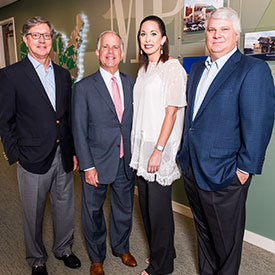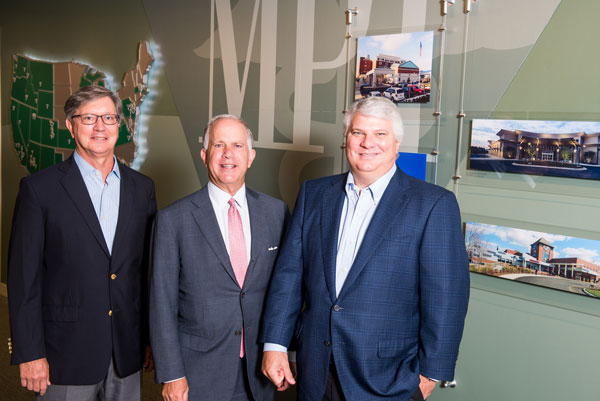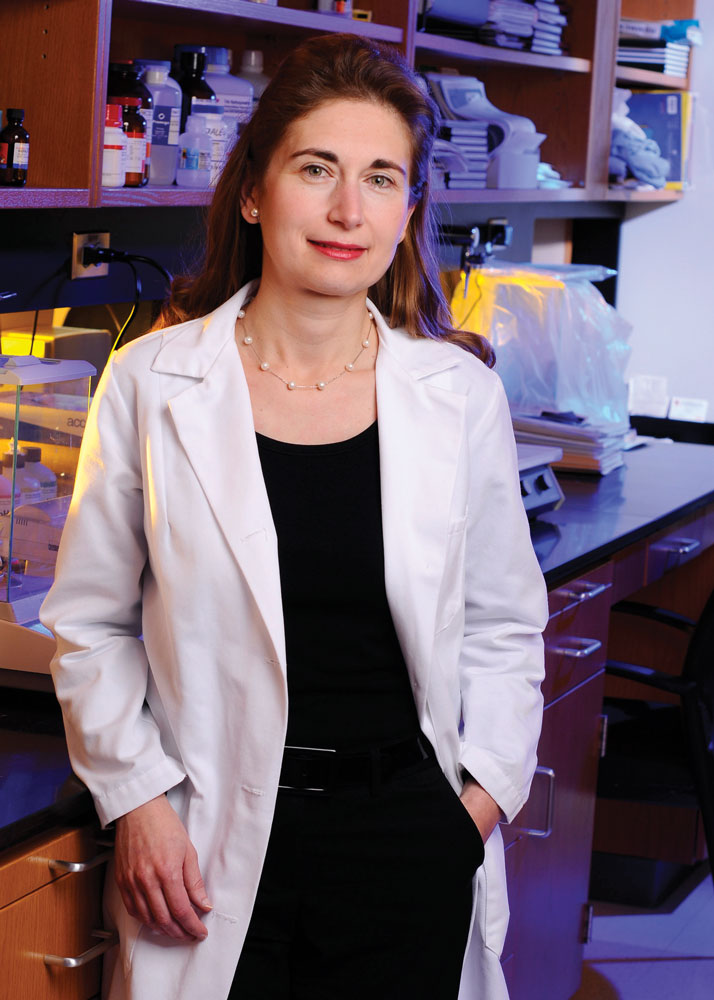 Sarah Silverstein (second from right) was an inspiration behind Medical Properties Trust’s gift to the UAB Comprehensive Diabetes Center.Four Birmingham businessmen didn’t bond over a love of shared hobbies. Instead, they realized their common interest is helping eradicate a disease that affects more than 29 million Americans: diabetes. And for these men, talk wasn’t where it ended. A recent $2.5 million gift from Medical Properties Trust (MPT) to the UAB Comprehensive Diabetes Center (UCDC) that UAB School of Medicine has agreed to match is where it is beginning.
Sarah Silverstein (second from right) was an inspiration behind Medical Properties Trust’s gift to the UAB Comprehensive Diabetes Center.Four Birmingham businessmen didn’t bond over a love of shared hobbies. Instead, they realized their common interest is helping eradicate a disease that affects more than 29 million Americans: diabetes. And for these men, talk wasn’t where it ended. A recent $2.5 million gift from Medical Properties Trust (MPT) to the UAB Comprehensive Diabetes Center (UCDC) that UAB School of Medicine has agreed to match is where it is beginning.
MPT’s co-founders Edward Aldag Jr. and Emmett McLean didn’t need convincing from philanthropists David Silverstein and Benny LaRussa Jr. to provide the company gift to the center.
“It was an easy inspiration,” says Aldag, CEO and president of the second-largest owner of hospital beds in the U.S. with a reach that extends to five countries. “We are in the health care business, and diabetes is one of the worst and most prevalent diseases in this country. We heard what Dr. [Anath] Shalev’s team had going on, and it was an easy decision to give this gift.”
Their gift will help combat an epidemic in Alabama. “We are in the buckle of the diabetes belt and are typically either the No. 1 or No. 2 in the nation in terms of our diabetes prevalence. This gift addresses an urgent need,” says Shalev, the Nancy R. and Eugene C. Gwaltney Family Endowed Chair in Juvenile Diabetes Research and the director of the UCDC.
R. Steven Hamner, MPT’s chief financial officer and co-founder, agrees the gift is vital to advancing progress in the field. The three MPT leaders were also inspired to make this philanthropic donation because two valued employees have Type 1 diabetes, one of whom is Silverstein’s daughter, Sarah Silverstein.
“It’s personal to us as a company,” says McLean, MPT’s executive vice president and chief operating officer. “I think our other employees didn’t realize these two have diabetes because they look so healthy, but diabetes is an indiscriminate disease. It would be wonderful if the Medical Properties Trust gift could give those living with diabetes healthier lives.”
Fathers on a Mission
 Medical Properties Trust co-founders Emmett McLean (left) and and Edward Aldag Jr. (right) with David Silverstein (center). Providing healthier lives for people with diabetes is a cause Silverstein and LaRussa have championed since their daughters, Sarah Silverstein and Chelsey LaRussa Heslop, were each diagnosed with Type 1 diabetes as children almost 20 years ago.
Medical Properties Trust co-founders Emmett McLean (left) and and Edward Aldag Jr. (right) with David Silverstein (center). Providing healthier lives for people with diabetes is a cause Silverstein and LaRussa have championed since their daughters, Sarah Silverstein and Chelsey LaRussa Heslop, were each diagnosed with Type 1 diabetes as children almost 20 years ago.
“At the time Sarah was diagnosed, I knew very little about the disease,” admits Silverstein, a principal at Bayer Properties Inc., who teared up while talking about his daughter’s fight. “But having a child with a life-threatening disease puts everything into perspective, and I made a commitment to Sarah that I would better understand the disease and do what I could to raise money to find a cure.”
Silverstein has lived up to that promise. He and LaRussa initially raised $15 million through private donations and gifts from the Diabetes Trust Fund to establish the UAB Comprehensive Diabetes Center in 2008.
“It’s important for people to understand that UAB made an institutional commitment to establish the Comprehensive Diabetes Center, and they didn’t do that randomly,” notes LaRussa, CEO of Sterling Capital Management. “Dr. Shalev and the team she has assembled are world-class, which gives the center immediate credibility. That was one of the mandates David and I had when this all started.”
A World-Class Team
 Anath Shalev directs the UAB Comprehensive Diabetes Center.Shalev is passionate about the work she and her team are doing in the field of diabetes. Their research has already shown that the common blood pressure drug verapamil completely reverses diabetes in animal models, and she says this philanthropic donation will enable more advances in the field. “This gift is really broadening the scope of our work and bringing us a major step forward,” she says.
Anath Shalev directs the UAB Comprehensive Diabetes Center.Shalev is passionate about the work she and her team are doing in the field of diabetes. Their research has already shown that the common blood pressure drug verapamil completely reverses diabetes in animal models, and she says this philanthropic donation will enable more advances in the field. “This gift is really broadening the scope of our work and bringing us a major step forward,” she says.
Shalev notes the gift will support two key efforts: recruiting new faculty to enhance the center’s robust interdisciplinary research and finding new, noninvasive tools and methods to measure a patient’s functional beta cell mass—an important indicator of disease stage and progression, but also of therapeutic success.
“We currently have more than 250 faculty members and about an additional 170 trainees,” says Shalev. “So far, we have developed a very strong collaboration across disciplines and have expanded particularly the area of cardiovascular disease as it relates to diabetic cardiomyopathy. These funds will help increase the number of faculty even further and will allow us to expand the area of diabetes complications research into other organ systems like the kidney and eye as they relate to diabetic nephropathy and retinopathy and to ultimately improve quality of life.”
The second effort involves overcoming a major hurdle in the field of diabetes treatment: finding a reliable measure of functional beta cell mass in humans. Beta cell mass regulation is critically important to understanding diabetes, which is a disease characterized by a near-absolute (Type 1) or relative (Type 2) deficiency in the number of pancreatic beta cells that produce insulin.
“Currently, if we want to assess how many functional beta cells an individual has, we have to put them through a rigorous and time-consuming process with multiple blood draws over several hours and then do fancy math that only gives us an estimate of the functional beta cell mass,” says Shalev. “That is obviously not ideal. It is why we’re looking for some easily measurable biomarkers so we can better monitor natural disease progression and, even more importantly, assess the effectiveness of novel treatment approaches that target beta cell loss as the underlying cause of diabetes.”
The End Goal
Shalev and her team at UAB, as well as Aldag, McLean, Silverstein, and LaRussa agree that everyone in the field of diabetes research is working toward one goal: curing the disease.
“When we started this company in 2003, we always had the intent to give back to the communities in which we work,” says Aldag. “Birmingham is where our company is headquartered, and the opportunity for us to give back and be a part of potentially finding a cure for diabetes is truly wonderful.”
They are certain UAB will play a major role in ultimately finding a cure for diabetes. “UAB is a highly regarded medical research center throughout the world, and the brightest minds in all the medical fields are right here in Birmingham,” adds LaRussa. “With the collaborative environment at UAB that can ‘crack the code’ toward finding a cure, it makes all the sense in the world to have this center here.”
For more information about giving to the UAB Comprehensive Diabetes Center, contact Erica Hollins at (205) 996-6839.
By Emily Henagan